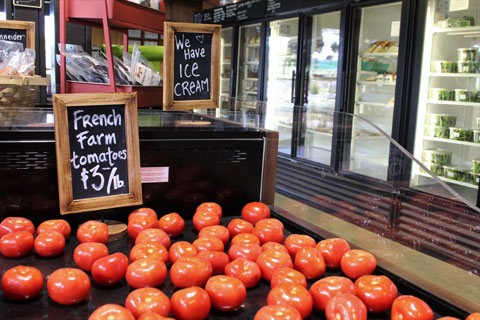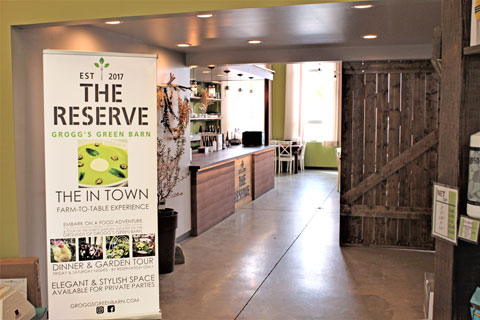8/1/2019
A Teaching Moment
David Longron

Agritourism used to be u-pick blueberries and model farms with fresh cheeses and overpriced jellies and jams in pretty jars. For the average retail nursery, it was vegetable plants and seeds, perhaps some fruit trees and onion slips. The recent surge of consumer interest in locally grown and sourced foods has created a unique opportunity for the retail nursery industry and many nurseries are exploring ways to take advantage of this increased interest.
Pictured: Inside the store at Colonial Gardens. The case on the wall contained their fresh picked greens along with locally grown meats and cheeses (and ice cream!).
Retail nurseries have actually been in the agritourism business all along, but they might not have thought about it in that way. Nurseries grow and purchase “crops” just like farmers. They are, in essence, farming in a bucket. To tweak a business phrase, it just requires a little thinking outside the pot. Doing so can give a business more diversity, expand their profile and exposure and, most importantly, improve the bottom line.
Going Whole Hog
Bryn Take never knows exactly what he’s going to be doing each day. His official title is Director of Fruit and Vegetable Production. When asked to give a job description he tells me, “Job description? I couldn’t even write it.” Bryn is in charge of the agricultural arm of Colonial Gardens in Blue Springs, Missouri, a suburb of Kansas City.
Colonial Gardens has gone all-in on the concept of agritourism. They grow and sell crops. They partner with an onsite restaurant that focuses on farm-to-table meals. They’re in the process of developing a u-pick orchard and berry patch, and have their eyes set on raising chickens and cows as well. In the winter, they grow tomatoes in an unused greenhouse and sell them at the nursery.
The goal is to make the nursery more than just a place to buy plants. “The vision,” Bryn explains, “is that it’s going to be a center for the community to be involved with.”
Most nurseries won’t have the space or resources to do what Colonial Gardens is doing, but just about every nursery can do one or more of these things.
Direct Sales
Across the parking lot from the main store is a 36-ft. x 200-ft. greenhouse affectionately called “Big Bertha” by the employees. Inside are rows of raised planters in which they grow various crops. During a March visit, it included leaf crops, carrots and radishes. These are sold in the main store and also used by the onsite restaurant. This is by far the most profitable part of what they’re doing right now. The investment was minimal (the greenhouse was already there) and anyone that’s purchased mixed greens can testify to their hefty cost.
Many nurseries, especially in the south, have empty greenhouses or cold frames in the winter. Cole crops need little if any heating to grow. Even though they’re further north, Bryn says they don’t use any supplemental lighting. Most of these crops are quick producers and require minimal care. Tomatoes require a bit more time and investment, but also a return a higher yield and higher profits. Beyond the direct benefit of sales, almost as importantly, crops such as these get customers into your business in a time of year when traffic is needed.
Agritourism & Marketing
Colonial Gardens conducts tours of their operation with school children. “A lot of school kids have never seen a carrot pulled out of the ground,” Bryn tells me. In an increasingly urban world, nurseries can provide a much-needed link between the food that children consume and how it’s grown. Events such as these assure a new generation of gardeners for the future. Bryn also does YouTube videos talking about various aspects of their growing operation–another low-cost, high-potential marketing tool.
 Pictured: The Reserve farm-to-table restaurant at Grogg’s Green Barn.
Pictured: The Reserve farm-to-table restaurant at Grogg’s Green Barn.
Carla and Kelly Grogg of Grogg’s Green Barn in Tulsa, Oklahoma, also focus on the marketing aspect. They grow crops as well, but not for direct sale. The garden is used primarily for demonstration with an emphasis on organic practices and sustainability. The raised bed gardens are used for tours, both formal and informal, which in turn, generates direct sales for the plants and soil amendments sold at the nursery. The agricultural aspect has become more and more important to Grogg’s.
“I feel like that is almost our core business now—edible gardeners,” Carla says. The garden also provides produce that’s used in their on-site demonstration kitchen, The Reserve, where a local chef serves organically focused eight-course meals every Friday and Saturday evening.
The meals at The Reserve have helped expand their customer base. At first, they assumed their regular customers would be the ones coming to the meals, but as it turns out, most of the diners come from a higher income bracket. “We’ve hit this other target market that has excess cash flow,” Carla reveals.
But what really sets Grogg’s apart from the everyday nursery is the chicken coop. It began as an aside, with an employee who was knowledgeable in the area. Carla didn’t come from a farm background.
“I was raised with Labradors,” she tells me. Now it’s become a major draw. They use the eggs produced by the two dozen chickens in meals at the restaurant. The classes they hold on growing backyard chickens have grown so large they require a reservation.
Spreading the Wealth
Besides direct sales and marketing, agritourism opens the door for partnering with local growers or organizations, enhancing a sense of community and creating symbiotic relationships. In addition to the school tours, Colonial Gardens partners with nearby farmers and sells locally produced products such as honey, cheese and meats from the same cooler they sell their own produce from. The Reserve has allowed Grogg’s to partner with local charities. They also sell heirloom tomato plants grown by a local specialist.
Connections such as these are helpful to a local nursery on several levels. Most notably perhaps, it provides retailers some exposure to new customers who might otherwise not be familiar with the business. GP
David Longron is a freelance writer living in northwest Arkansas. He has been in the horticulture business for over 35 years. You can reach him at arlongron@cox.net.